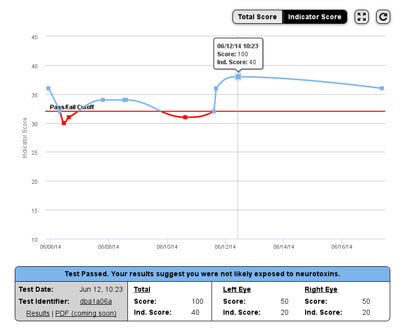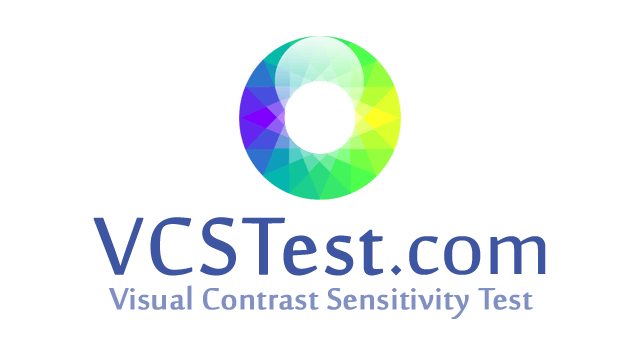Welcome to VCSTest.com!
This website provides an online visual contrast sensitivity (VCS) test and symptom assessment to
individuals who suffer or suspect they may suffer from a health condition that affects contrast
sensitivity, and to healthcare professionals and researchers worldwide.
We accept contibutions via credit card in 138 currencies across 225 countries, territories, principalities, and microstates. Contribution amounts are converted into your currency, and in the United States we ask for a contribution of USD $15.00 for detailed results and additional tests, though packages of 3, 5, and unlimited test credits are available at reduced rates. If you cannot contribute due to illness-related financial difficulties, but need detailed, printable/forwardable PDF results, or to test again, contact us after establishing your account and taking your free test and we can upgrade your results and/or provide a free test credit.

What is visual contrast sensitivity testing?
Visual contrast sensitivity testing measures your ability to see details at low contrast levels and is
often used as a nonspecific test of neurological function. Similar in form to a standard
audiometry hearing test, a VCS test generally involves the presentation of a series of images of
decreasing contrast to the test subject and the recording of the contrast levels where patterns,
shapes, or objects can or cannot be identified. The results of the test can then be used as
an aid in the diagnosis of visual system dysfunction.
What can cause a contrast sensitivity deficit?
Many things can affect the ability to perceive contrast. These include nutritional
deficiencies, the consumption of alcohol, drug/medication use, and exposure to endogenous or exogenous
neurotoxins and/or biotoxins, including volatile organic compounds (VOCs), venom from animal or insect
stings or bites, actinobacteria, some species of mold and the mycotoxins and microbial VOCs they
produce, cyanobacteria, dinoflagellates (particularly Pfiesteria and Ciguatera), apicomplexans,
parasites, heavy metals like mercury and lead, and the pathogens responsible for Lyme disease
and its common co-infections. For more information, see our
Research resources.
Why is VCS testing diagnostic?
VCS testing, by itself, is generally not diagnostic for any specific
condition (including either mold or neurotoxin exposure), but a positive result may suggest the existence
of a health and life-affecting clinical or subclinical process. If your results are positive, you could have
a number of different conditions and should see your healthcare provider.
What about symptoms?
VCSTest.com offers an optional symptom assessment that can help you determine if you might be suffering
from Chronic Inflammatory Response Syndrome (CIRS). The CIRS assessment is 37 questions long
and adds two (2) pages to our detailed results PDF. The results should be shared with
your healthcare provider, or one familiar with CIRS.
How does your test compare to the test offered by Dr. Shoemaker?
VCSTest.com contrast sensitivity tests have been taken tens of thousands of times and are widely
used and relied upon by individuals, healthcare professionals, and researchers all around the
world. Our new Online Contrast Sensitivity Test™ - the
OCST™ - is identical to the Functional Acuity Contrast Test, or
FACT®, used by Dr. Shoemaker and others involved in neurotoxin research in terms of
contrast levels and spatial frequencies tested, but it uniquely features on-screen display size and
gamma calibration to ensure that results are accurate and valid regardless of the type, size, and
settings of the device used to test. Additionally, OCST test images are generated
dynamically in software, which ensures that images are of the highest quality and that the test
is different each time you take it. Our biotoxin-illness pass/fail algorithm is the same
proven algorithm used by Dr. Shoemaker, though the OCST also scores performance at the other tested
spatial frequencies using criteria developed from current contrast sensitivity-related research.
We provide up to 4 pages of enhanced and expanded results and interpretation, including research-based
information on what deficits at each of the tested spatial frequencies might suggest. Results
are immediately available on-screen, and in printable and forwardable PDF format if you choose to
make a contribution.
The OCST is the most advanced, most accurate, and most reliable FACT-based contrast sensitivity test
available online.
How much does testing cost?
For individuals and patients of referring healthcare providers, testing is either free (with limited results)
or by contribution. Currently, new individual/patient accounts receive one free test initially, though free
results are limited to a positive/negative determination and raw VCS scores. If you need a detailed results
interpretation and a printable/forwardable PDF, if you'd like to have your results forwarded to your referring
healthcare provider, or if you want to test again, we request a small contribution, though we offer free services
to those experiencing illness-related financial difficulties.
We accept contibutions via credit card in 138 currencies across 225 countries, territories, principalities, and microstates. Contribution amounts are converted into your currency, and in the United States we ask for a contribution of USD $15.00 for detailed results and additional tests, though packages of 3, 5, and unlimited test credits are available at reduced rates. If you cannot contribute due to illness-related financial difficulties, but need detailed, printable/forwardable PDF results, or to test again, contact us after establishing your account and taking your free test and we can upgrade your results and/or provide a free test credit.
All contributions are used to fund the operation and ongoing development of VCSTest.com, to
provide free tests to those who meet our criteria for free testing, and to spread awareness of contrast sensitivity
testing. Thank you for your support.

How much time do I need to take the test?
Generally, the VCS portion of the test takes between 10 and 15 minutes. The symptom assessment can add another 5 to 10 minutes.
Great! How do I get started?
Register for a free account, which will enable:
- storage and retrieval of previous test results;
- visual tracking and plotting of test scores on an interactive chart; and,
- free automatic test retake reminder emails!
- detailed results interpretation and analysis;
- email and downloadable test results in PDF format which can be printed and/or forwarded to your doctor;
- email and downloadable PDF and CSV test results summaries; and,
- free, optional automated voice and SMS test retake reminders.

